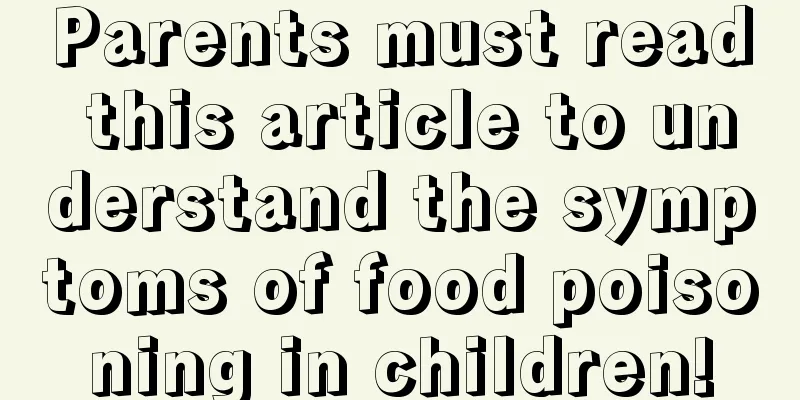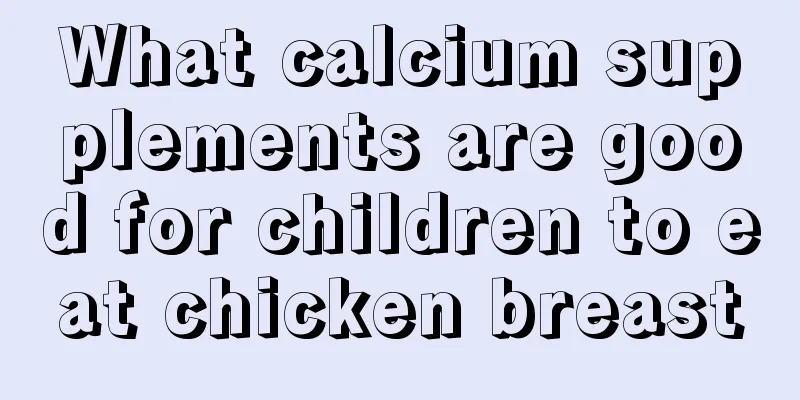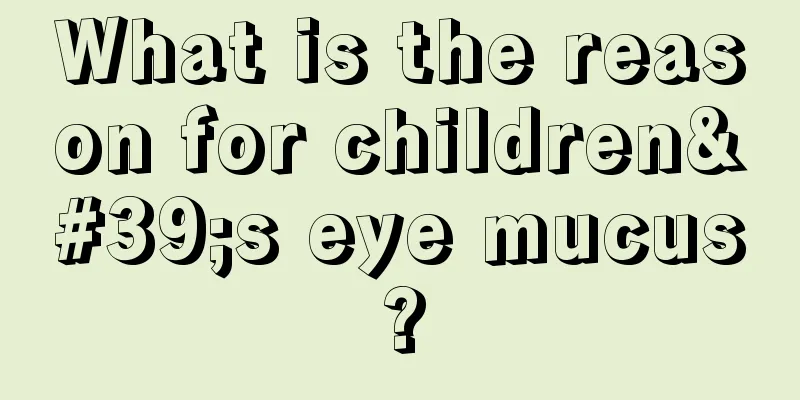Parents must read this article to understand the symptoms of food poisoning in children!

|
When children have food poisoning, a series of symptoms will follow, which will pose a great threat to the child's health. Therefore, parents must understand these symptoms, understand the causes, and further master prevention methods. 1. The abdomen is round and bulging, with a cord-like or mass-like feeling; 2. Sour or foul breath; 3. Smelly or foul-smelling stools, large amounts of stools, large pieces of stools, and smelly farts; 4. The tongue coating is thick and greasy, yellow, and the middle part of the tongue coating is particularly thick; 5. The baby chews the nipple, bites people, and drools; 6. Sleeping on one's stomach; kicking the quilt, rolling over, sticking out the buttocks, being hot and irritable, grinding teeth; sleeping with eyes half open and half closed, unable to close the mouth, drooling; 7. If you have a persistent fever, cough, excessive sputum, or recurrent constipation; 8. Blinking; picking nose, always wanting to drink water when eating; 9. The baby has symptoms such as sallow complexion, loss of appetite, abdominal distension, burning or low fever in the chest, abdomen, hands and soles, hot flashes and night sweats, occasional flushing of the face, irritability, restless sleep, prone lying, dry and hard stools, short and yellow urine, red tongue with yellow and greasy coating, and slippery pulse. 10. Bad breath in children. When milk and food stagnate in the stomach, bad breath often occurs first, especially bad breath and sour mouth in the morning, which are manifestations of milk and food stagnation. Clinically, this is called high-level food withdrawal. When this happens, you can reduce your food intake or skip one meal to help recover your gastrointestinal function. 11. Restless sleep at night. Crying with anxiety, hot palms, kicking off the quilt and clothes, and sweating a lot on the head when just falling asleep are all caused by excessive food accumulation in the stomach and intestines, resulting in internal heat. As the saying goes, "If you want your child to be at peace, keep him a little hungry and cold" and "If the stomach is not in harmony, he will not sleep well." As children grow older, especially after adding complementary foods, they should be careful not to eat too much at dinner. Children around one year old should not drink or eat too much before going to bed. 12. Refusing to eat. If a child occasionally has a loss of appetite, refuses to eat, or the food does not taste good, do not force him to eat, but let him eat less. |
<<: What should I do if my baby has food poisoning? These dietary therapies are very effective
>>: What should children with functional dyspepsia eat? Don't miss these foods
Recommend
What causes high protein in children's urine?
Many people are worried about the health of their...
How to arrange diet for a four-month-old baby with bronchitis
It is common for babies to get bronchitis at four...
What causes black spots on one-year-old baby's teeth?
Teeth are an important part of our lives and an i...
What is the treatment for cough in children?
Affected by the surrounding environment, some ger...
Child's nail peeling
In life, many parents have found that their baby&...
What to eat for 8-month-old baby with constipation
In people's minds, constipation only occurs i...
Causes of forehead protrusion in babies
The condition of baby's protruding forehead m...
What should I do if my one and a half year old baby drools?
Recently, the baby has been drooling and the moth...
What are the dangers of eating instant noodles for children?
I believe everyone is familiar with instant noodl...
What should I do if my child has a fever and convulsions?
Children often catch colds and have fevers due to...
Why are children thin? What should they eat more?
The reason why children are thin is not necessari...
How to treat high blood count in children
High blood count is a kind of inflammation that w...
Symptoms and treatment methods of spleen deficiency in children
When children show symptoms of poverty, parents s...
What causes poor vision in children?
Many years ago, it was very rare to see people we...
What to do if your nine-month-old baby has abdominal distension
For nine-month-old babies, they have already star...









